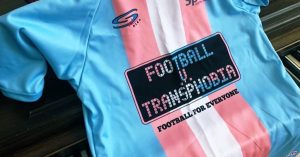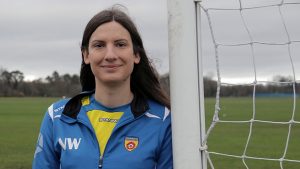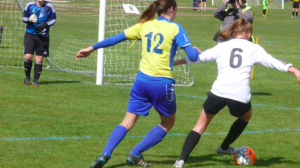One-size-fits-all policies not the right answer for transgender inclusion in sport

There should be fewer barriers for transgender athletes to compete at grassroots level sport than at elite levels.
This is particularly true for trans women, who are often expected to meet Olympic level hormone standards to play amateur sport.
Currently, the Football Association’s (FA) policy is the same for the Women’s Super League (WSL) all the way down to the lowest tier of women’s football in the UK.
This means that trans women have to meet elite level standards just to play football with their friends.
But, if cisgender women don’t have to meet the same playing levels as a player in the WSL to compete at a grassroots level, why should trans athletes be expected to meet WSL standards to play grassroots football?
Every sport is different, every level of sport is different and every athlete is different.
So why do policies require everyone to be the same?
A more intersectional approach would allow for easier pathways for transgender athletes playing at grassroots level.
Associate Professor of Equality and Diversity in the School of Sport, Health and Social Sciences at Solent University, Dr. Rory Magrath, believes that current policies, particularly in football, are restrictive.
“I think there’s a case that organizations tend not to have a complete understanding of trans athletes and their necessities and needs, and so often that is reflected in policy,” said Dr. Magrath.
In addition to this, Magrath says many inclusion policies encompass all LGBT+ people, when separate policies are needed for different groups.
“We kind of lump, and I’m talking about myself included here as a scholar, we kind of lump LGB and T in together and that is also reflected in policy.
“A gay male athlete’s requirements are completely different to a trans woman’s needs, for instance.
“Not only do we need to have separate policy for female grassroots football and the WSL, but we also need to have a potentially separate policy for gay men and lesbians, or bisexual and trans folks, and across different levels of football.
“Some of the policies that we know about or that exist are too generic or too universal.
Dr. Magrath says that the issues around trans inclusion are far too complex to lump together with LGB issues and believes there is a strong case for separate policies between L, G, B and T as well as at different levels of sport.
“I think organizations are getting better at recognizing equality, diversity and inclusion needs. But I think there’s still a significant amount of work to be done.”

Footballer Natalie Washington, who plays for Rushmoor FC, transitioned in her late twenties and had to meet several standards to play for her team.
“I always used to play football before and I stopped when I transitioned because I thought that’s it, probably is going to be a bit hard now,” said Washington.
But, after watching the Women’s World Cup in 2015, Washington decided she really wanted to get back into football.
She emailed her local club, and was lucky to find a welcoming group of women who she was able to train with as she went through the FA’s process to meet the standards to compete.
Washington says a lot of people fail at that first barrier, and that the requirements that follow are even more challenging.
“The wording of the policy is something along the lines of, you have to have a testosterone level that is at a certain level for an amount of time, and they don’t specify what their level is and they don’t specify what that appropriate amount of time is.
“It took a long time to get my first response, which was saying that I didn’t meet the criteria, my testosterone level was too high, so then I had to change my medication to get it suppressed further and that took about a month.
“And then I had to send them a blood test, which they were happy with. But then they said, okay, now it’s got to be at this level for a year. So then it’s wait another year.
“So when people say, trans women could just identify as women and get into women’s sport, it doesn’t really work like that.”

These barriers that exist in football are not unlike many other sports, however, one sport is doing things a little differently.
Ultimate frisbee is a fast growing sport and UK Ultimate provides an inclusion policy for trans athletes that removes all barriers for most levels of the game.
If an athlete wants to compete in an international ultimate event, or a qualifying event for an international one – such as UK Nationals – then they would have to meet the testosterone levels required by the World Flying Disc Federation, which follows the IOC’s policy.
However, every other event and level of the sport requires no levels to be met – trans women are women and can play ultimate without having to meet any standards. Only if they want to compete at the highest level of the sport in the UK, must they then meet hormone standards.
This policy removes significant barriers and creates a more inclusive environment in the sport.
Cassandra Lee has been playing ultimate for her university in Bath, and has moved on to playing for a women’s club team this year.
For her, playing is about being social and being able to express herself on the pitch.
“I’ve always been, what I like to call, a casual player,” said Lee.
“I don’t do sport to keep fit or anything, that’s usually a bonus. I enjoy playing, playing a team sport and I know, in my mind, I get a bit competitive. But I like to have fun too.”
In addition to wanting to enjoy a team sport, a policy like UK Ultimate’s means that Lee doesn’t have to take hormones just in order to play – something she’s still unsure about doing.
Lee explained that a big part of her identity has always been that she is athletic, and taking hormones could have some effects on her athleticism and on her mental health.
“That’s one of the main things I worry about with hormones as well. I’ve had this value of myself, this identity of myself that I’m very fast at sprinting and I’m always happy.”
“I don’t know, at the moment I feel like I can maintain a level of athleticism, but I know with hormones, things will change. But then I also don’t know what things will change. It’s that fear of the unknown.”
Inclusive policies mean that athletes like Lee can continue to play the sport they love while taking their time going through the process of transitioning.

Washington, who works with organizations such as Pride Sports and Football v. Transphobia, believes that policies should be focused on participation.
“I think, obviously, marginal gains are a thing at the elite level, but certainly at the grassroots level, it surely is more about participation,” Washington explained.
“And I think when you’re talking about people that pay to play, as we do at our level, it’s just in a park, and nobody’s winning money, nobody’s making money out of it. Nobody’s getting selected for their national team. You know, it’s just people who want to enjoy their sport. There really only needs to be some basic levels of pragmatism.”
The regulations and standards that trans athletes have to meet to compete in most sports can be demanding and take years to achieve.
For athletes, having access to sport while transitioning could provide significant positive mental benefits.
Sport provides a community for all people; it brings people together, it creates a common purpose. Trans athletes should have equal access to that community.
A more intersectional approach to policies would create easier access to sport at grassroots level and promote inclusion.
To get there, more transgender voices should be consulted on those policies to find the right solutions for different levels of play.
A one-size-fits-all approach is not the right answer for transgender inclusion in sport.